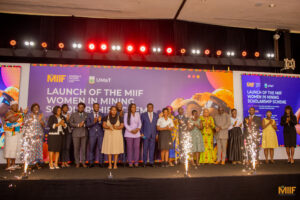By Joshua Worlasi AMLANU
The Minerals Income and Investment Fund (MIIF) has unveilled a GH¢20million scholarship scheme aimed at empowering women from mining communities.
The initiative, launched in partnership with the University of Mines and Technology (UMaT), seeks to increase female representation in an industry traditionally dominated by men.
MIIF CEO, Edward Nana Yaw Koranteng, speaking at the launch event emphasised the critical importance of investing in human capital alongside financial investments in the mining sector.
“We believe that just investing in equity, investing in the value chain etc. without investing in human capacity or human development will really just take us nowhere; you know, we hit a wall at a point in time,” Mr. Koranteng stated.

The scholarship programme aims to support up to 100 women annually from needy families in mining communities, focusing on bright students pursuing STEM course – particularly in engineering and metallurgy. This initiative is part of MIIF’s broader strategy to align human resource development with government policies and the fund’s objectives.
Mr. Koranteng highlighted the stark gender imbalance in the mining industry, noting: “There’s a huge gender disparity. If you look at mining, for example, you have just about 9 percent of women in mining, especially when it comes to mainstream mining. You look at the C-suite of mining, it’s even less than 9 percent”.
Research indicates that increased female participation in the sector leads to greater value creation. Mr. Koranteng emphasised this point, stating: “If you do research, it will tell you that the more you invest in women, the more you have women in the sector, the more value is created for the sector”.
The MIIF-UMaT Women in Mining Scholarship Scheme is not just about addressing gender inequity; it’s also a strategic investment in Ghana’s future.
Mr. Koranteng drew parallels with other government educational initiatives such as the Free Senior High School (SHS) programme, emphasising the urgency of such investments. “It’s almost like the free SHS, you know; you have the argument that we should wait 10, 20 years before we implement free SHS, but the negative social impact does not wait for you,” he explained.

The CEO stressed the paramount importance of human capital in national development, particularly in the context of natural resource management. “As we see in the mining sector, the resources are good – but the resources do not develop a nation. It is brains that develop a nation,” Koranteng asserted.
He pointed out the contrast between resource-rich countries like the Democratic Republic of Congo and resource-poor but economically advanced nations like Japan to illustrate his point.
The scholarship scheme is part of a broader educational and research initiative by MIIF.
Mr. Koranteng revealed plans for expanding the programme’s scope, stating: “We’re looking at whether we can support other universities like the University of Ghana and University of Science and Technology.”










